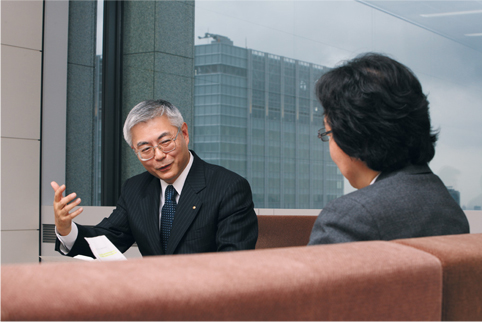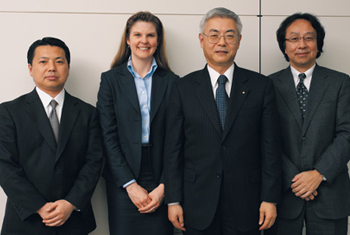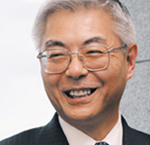Interview with Kazuo Furukawa, Hitachi Corporation
“Fundamentally, education is about continuous effort.”
Kazuo Furukawa, President of the almost 100-year-old Hitachi corporate empire, explains how he aims to build the worldwide talent pool that will supply the next generation of Hitachi top executives, laying the foundations for a successful global future.
KAZUO FURUKAWA has been at the helm of the Japanese giant Hitachi and its global workforce of 350,000 employees for just over a year. A loyal contributor to the company since 1971, the new President has committed himself to tackling three major challenges: improving the profitability of Japan’s number one electronics conglomerate; increasing its global market share; and developing a comprehensive environmental strategy for a group that covers a vast range of sectors – from telecommunications and nuclear power plants to hard disk drives for PCs. These challenges can only be tackled, however, when a fourth Herculean task is complete: In a measure that is close to Furukawa’s heart, Hitachi is aiming to put in place a systematic process of identifying and developing the young international executives who will lead the almost 100-year-old corporate empire into a successful global future.
The Focus: Mr. Furukawa, looking back on your career, what educational influence was the most important in enabling you to become a leader?
Kazuo Furukawa: I came up through the Japanese education system, from primary school to high school and university. Now I have been with Hitachi for almost four decades. Some of what I needed to know I acquired from the education system, but I learned most during my first decade at Hitachi. During those first ten years I learned the importance of producing goods in a neatly organized corporate system, as well as the importance of leadership in running such a system.
The Focus: You are now in command of a workforce of over 350,000 employees. What kind of leadership experience helped you reach the very top of the corporate ladder?
Furukawa: Many of my leadership qualities came from experiences managing tough mega-development projects. But for other people such qualities may come from experience as the leader of a sales team rather than in manufacturing or engineering. Ultimately, the environment a leader comes from is not important – we should allow leaders to exert leadership in their own style.
The Focus: What are the most important leadership skills?
Furukawa: This has been a point of discussion at Hitachi since 1998 – and is what gave rise to what we call the Hitachi Values. These values set out the qualities we seek in our leaders. One aim of the Hitachi Values is to help our executives share an awareness of being leaders who bear responsibility for realizing Hitachi’s corporate vision. Our values set out the priorities that managers must observe when they go about their tasks and make critical decisions.
“We could not go global if we failed to successfully manage staff of all nationalities, genders, ethnic groups, languages and cultures.”

The Focus: Can these Hitachi Values be transferred across geographies and functional borders?
Furukawa: Of course. The Hitachi Values define the common values that all Hitachi’s managers are to follow. We also use them as criteria to assess our managers’ progress.
In order to transform these fine ideas into reality we focus on a set of skills that we also use as metrics in appraising the performance of our managers. The ten criteria are: Customer Satisfaction, Trust, Speed, Initiative to Challenge and Reform, Clarification and Penetration of Vision and Strategy, Accomplishment of Goals, Knowledge and Skills, Leadership, Respect for Individual Initiative, and Human Resources Development. These criteria are reflected in our HR policies and compensation packages, and we find that staff appraisal serves as an incentive for people to observe the Hitachi Values and enhances motivation among the workforce.
The Focus: In your experience, which of these ten values are the most important in shaping leadership behavior at Hitachi?
Furukawa: I would say that “Trust” and “Initiative to Challenge and Reform” are the two most important criteria for the behavior of a leader. Individual leaders are required to meet these criteria in their work, but we also believe it is vital they should experience positions outside their specialist field. That is why, as part of corporate policy, leaders are involved in job rotation that takes them to affiliated companies overseas, where they can acquire the necessary knowledge and ways of thinking for managers at higher levels. We actively offer these opportunities to our younger staff or to those who are at an early stage in their careers. And we evaluate the effectiveness of rotation against improvements in relation to the ten criteria.
The Focus: At what age do people typically enter this job rotation program?
Furukawa: At the moment, on-the-job training at our overseas operations and overseas education programs is offered to selected staff in their 20s, whereas horizontal job rotation for managers concerns mostly people in their early 40s who have already assumed specific managerial posts. I believe the age eligibility for horizontal job rotation should be lowered to people in their early or mid 30s. I first experienced such an overseas posting in my late 40s, and at the time I felt I should have had such an experience ten or fifteen years earlier. We only introduced horizontal rotation for managers two or three years ago and these are still early days, but it seems to have had a positive effect in terms of enabling people to learn about different cultures and diverse business climates.
“Harmony, sincerity and a pioneering spirit are very important. Those who fail to acquire these personal skills will not be recognized as Hitachi men and women.”
The Focus: Japan’s leading financial newspaper Nihon Keizai Shimbun reported today that Hitachi ranks top both in terms of its contribution to society and in corporate governance. How do you make sure that Hitachi’s top managers take these issues seriously?
Furukawa: The horizontal element that provides common values across the organization is the Hitachi Spirit. Ever since Hitachi was founded in 1910 by Namihei Odaira, we have maintained our founding concepts of “Wa,” which stands for harmony, trust, and respect; “Makoto,” which stands for sincerity, fairness, honesty, integrity; and “Kaitakusha-seishin,” which is pioneering spirit and challenge.
When compared with functional skills, the generalist skills of harmony, sincerity and the pioneering spirit may sound old-fashioned to some people, but I believe they are very important for Hitachi. These terms were instilled into the Hitachi corporate culture almost 100 years ago and this Hitachi Spirit remains alive today as an unbroken tradition. Those who fail to acquire these personal skills will not be recognized as Hitachi men and women.
As for our contribution to society, Hitachi implements a fundamental rule of corporate conduct – “Basics and Ethics” – which is practiced over and above the Hitachi Values and the Hitachi Spirit. Compared with other Japanese firms, Hitachi has been quick off the mark in implementingCSR and we do indeed take pride in being the front runner.
The Focus: Does Hitachi provide any special educational programs for staff on these topics?
Furukawa: We defined our Corporate Code of Conduct around 20 years ago. All staff receive a booklet setting out this code together with a checklist, and we ask employees to check their own conduct against these materials. The code has three instructions written large: Thoroughly practice fair and transparent corporate behavior; conduct yourself in compliance with the law and with correct corporate ethics; and always take actions based on the principles of fair and orderly competition. Then if any problems occur, we judge the matter through office procedures after consulting these maxims and the Code of Conduct.
As a business we must of course look to the bottom line – but we drill these standards into our staff at the outset and then monitor observation of these standards through on-the-job training.
The Focus: In a recent message from the President, you stated that by reminding each employee of Hitachi’s founding philosophy – namely to contribute to society through technology – the company should strive for further growth. Just how do you teach and instill that philosophy?
Furukawa: Essentially education is about continuous effort. We have an expression: “persistence is power,” and accurate repetition can motivate and enhance the learning experience for both the student and the teacher. I also firmly believe that sharing the Hitachi Spirit with managers around the world is important in developing Hitachi’s future executives. We are currently conducting a global training program called “Ready to Inspire.” This program invites around 1,000 managers each year in groups of 20 to learn about the Hitachi Spirit and discuss how to implement it in daily routines. I also visit various offices and operation sites both overseas and in Japan to share the Hitachi Spirit through direct communication with employees. The results of these visits can be followed on the company intranet and on my website “Furukawa’s room”.
The Focus: Traditional talent management in Japanese firms meant recruiting new graduates and bringing them up as corporate people. Today, globalization means that companies hire people with very diverse backgrounds. How does Hitachi bring employees all over the world into line with the Hitachi Values?
Furukawa: This has been a major topic of global human resources development at Hitachi for the past three years. For us, globalization is about managing diversity successfully. We could not go global if we failed to successfully manage staff of all nationalities, genders, ethnic groups, languages and cultures.
The Focus: How do you choose a particular candidate for a vacancy within your global operations?
Furukawa: The crucial factors here are the type of assignment, the effective use of human resources, and the progress of a person’s career through our global scheme, regardless of ethnic background or gender. In a related development, we have intensified our efforts to focus on global leadership by inviting many more staff from our overseas operations to attend programs. We also send selected staff on short-term business school courses overseas and exchange staff with various foreign affiliates. As a result, our efforts to address diversity have improved substantially. Today, sales revenues from overseas operations, including exports, account for 38 percent of overall sales revenues. We believe it is necessary for Hitachi to increase this ratio to 45 percent by 2009 and to more than 50 percent in 2010. To this end we must also develop our staff so that they can work in our international operations. We are currently trying to appoint people who are capable of leadership, regardless of their nationality. We develop them and place them in our international operations on the basis of their being the right person for the right job.
The Focus: So you now seek to measure Japanese and foreigners by the same rules?
Furukawa: Yes, and that is very tough on our Japanese staff, because we Japanese have to overcome a language issue. However, a substantial number of our Japanese employees now go abroad, not just to English-speaking countries but also to France, Germany, Russia and China. Such situations will reduce the significance of a boundary between Japanese and foreigners.
The Focus: Career development in Japanese firms takes a long time, while in foreign firms one regularly encounters divisional managers in their 30s and CEOs in their 40s. How can Japanese firms overcome such differences?
Furukawa: It is essential for us to make more efficient use of our junior staff. Fortunately, the Hitachi Group has a substantial number of affiliated companies, where our staff can have good opportunities to learn management. Junior managers aiming to become Hitachi leaders must work in top positions in order to develop their capabilities as senior executives. In this regard we identify global positions to assign candidates from the talent pool. These positions also include assignments in domestic operations. Appointments are for two years. Later, these people are assigned to other positions for another two years. This program is designed to speed up the career development process.
The Focus: The Hitachi Group numbers almost 900 companies globally. But do you have an adequate pool of talent capable of running such a global business?
Furukawa: We are working hard to tackle this very tough challenge. The key is to allow staff at an early stage in their careers to have a clear vision of becoming global business leaders. Using the Hitachi Values, we clarify the behaviors to be exhibited by individual staff and evaluate each individual’s progress in addition to assessing the achievement of annual business goals. We select potential leaders from various places within Hitachi, including from overseas, or hire candidates from outside Hitachi and put them through our leadership development process. In other words, we try to identify promising candidates for future leadership positions as early as possible and then we bring them up as leaders. I expect these processes to be firmly established as a means of creating a leadership pipeline within the next few years.
The Focus: What skills do the global managers of the future need to acquire?
Furukawa: At Hitachi, candidates are provided with an education, including counseling, in skills, attitude and various types of knowledge. Experience in overseas operations is particularly important, because there they encounter cultures with a completely different set of values to those of Japan. The way the market works and responds is also very different. Experiencing such differences not only provides a very good stimulus and lesson, it also affords a necessary opportunity to work in areas of business outside one’s specialist field and to attempt a top management role.
The Focus: Do you sometimes encounter situations where the manager of a division is reluctant to release a talented person?
Furukawa: Naturally, divisional managers – and individual candidates – may feel some resistance to a transfer from the consumer part of the business, say, to automobile components or the energy sector. But in such cases the divisional manager is asked, as a leader, to recognize the need to rotate personnel from the point of view of the company as a whole. In earlier stages of corporate-wide job rotation for leadership development we faced many challenges, but that situation has improved steadily.
The Focus: Isn’t it difficult to balance out the sense of independence of each division on the one hand and the strengthening of central control on the other?
Furukawa: It is indeed. While we have a single, solid Hitachi culture, each division also has a unique culture, often working at a different speed and using different time scales. Bringing a person who has the DNA of one division into another division is a challenge. But people who go through this do so in order to reach the next level. Part of my job is to persuade our divisions of the validity of this process.
“Although the traditional Japanese approach is revitalized, we still have much to learn from the Western business education system.”
The Focus: Does a Western-style business-school MBA offer a valid alternative to Japanese-style in-house leadership training? Which is the better way to educate corporate leaders?
Furukawa: The tough thing is to strike a balance. The systematic management training provided by an MBA seems very effective these days. However, if you push things too far, you risk diluting the advantages of the Japanese system that is based on organizational rather than individual power. I feel that Japanese business circles were once overly fascinated with MBA schemes and the like. Now they have returned to some extent to the traditional Japanese approach. But we remain in general unaccustomed to the systematic way of thinking that underlies the business culture of the West – in part because of less opportunities through the Japanese education system – so we still have much to learn from the Western business culture and its business education system.
The Focus: You mentioned earlier that your first experience of foreign countries came rather late in your career. What did you gain from this experience?
Furukawa: My three-year stay with a subsidiary in Atlanta when I was in my late 40s was an exciting and truly life-changing experience. In Japan, Hitachi is a household name, but in the US I was astonished to meet people who were unaware that Hitachi produced not only television sets, but also communications equipment, power generators and electric trains. I was shocked by the reality of surviving in different markets where different rules prevailed. I learned a lot about globalization from the American market. Afterwards I was engaged in the projects focusing on the United Kingdom, Europe and China. Now we face a borderless and powerful global market, so the starting point of our new operations must be an approach that learns from the market. Last week I traveled to the UK and Europe to talk with junior staff at local Hitachi operations. They had a good understanding of the Hitachi Spirit and I was encouraged to see that, although there is still some way to go, our policy of developing a talented pool of global leaders is becoming firmly established.
The Focus: What do you personally find most enlightening – people, literature, the cinema, music, or maybe sports?
Furukawa: Since my primary school days I have always written in my personal resumé that my favorite pursuits are reading and listening to music. But most recently I have been very much stimulated by Al Gore’s An Inconvenient Truth. Global warming has advanced the Doomsday Clock – though I am not sure whether by hours or minutes. As the President of Hitachi I am very worried by this problem and think long and hard about what we can do to sustain the planet, prevent further global warming and protect the environment. Hitachi’s DNA calls upon us to contribute to the preservation of our social infrastructure. And by 2010, when we step into another century of Hitachi history, we will decide our basic approach on this issue. This is my strongest interest right now.

The interview with Kazuo Furukawa was conducted by Alison Beckett, Egon Zehnder, London, Jiro Saruwatari (left) and Yoshiaki Obata, Egon Zehnder, Tokyo.

Kazuo Furukawa
Kazuo Furukawa, 60, has been President of Hitachi Ltd. since April 2006. Before assuming that position, from 2005 onwards he was Executive Vice President and Executive Officer of Hitachi. Furukawa enjoyed a model Japanese corporate career: He joined Hitachi in 1971 at the Totsuka Works, where he contributed to the development of telecommunications systems. He served at Hitachi Telecom (USA), Inc. from 1994 to 1997 and gained further overseas experience by leading the projects focusing on the UK, mainland Europe and China. He was named President and Chief Executive Officer of the Information and Telecommunications Systems Group in 2003, and in the same year assumed the position of Vice President and Executive Officer, before becoming Senior Vice President and Executive Officer in 2004. Kazuo Furukawa received his Master’s degree in Electrical Engineering from the University of Tokyo in 1971. At Hitachi, Furukawa’s involvement has always been in the telecommunications and information systems sectors. He is Hitachi’s first president to lack experience in the company’s heavy electrical machinery business. He expects future managers to show greater versatility – and at a far earlier age. Furukawa is currently developing a scheduled job rotation program worldwide, designed to give executives early management experience in fields in which they have little or no expertise, in order to prepare them for greater responsibilities in the future.

Ltd. Technology for society
Founded in 1910, Hitachi Ltd. is Japan’s biggest electronics conglomerate, with net sales of over US$ 80 billion and a workforce of over 350,000 at 900 subsidiaries. Hitachi’s products range from nuclear power plants to construction equipment and washing machines. The company is the world’s No. 5 plasma television set maker. The Group is struggling, however, with losses in its three core businesses – power plants, hard disk drives and flat-panel TV sets. “We will transform the Hitachi Group into a highly profitable company by making every business sector earn a profit,” President Furukawa promised in November 2006. And if profitability fails to improve, he added, Hitachi would withdraw from the respective business. Furukawa also declared his intention to increase oversight of the company’s operations while continuing to simplify its large and complex structures.
Furukawa is also keen for Hitachi to remain true to its founding philosophy of “contributing to society through technology.” If Hitachi is to continue to provide customers and investors with maximum value added, he says, the traditional Japanese company must develop a serious global perspective. And that calls for a management team capable of combining wide-ranging technical and cultural expertise.
PHOTOS: TAKESHI TSUNODA





